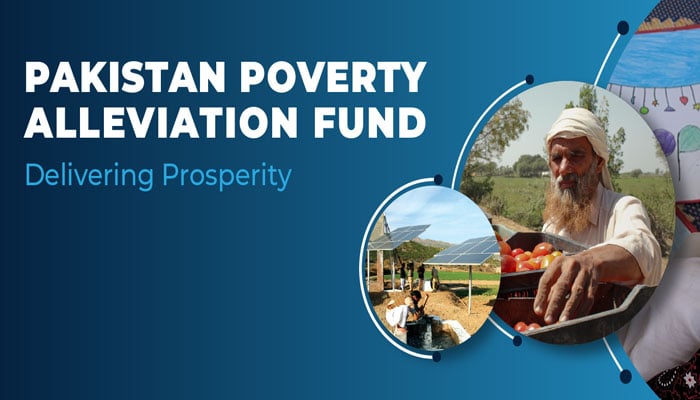PPAF plays leading role in strengthening food security
Pakistan’s food security situation remains a pressing concern, as evidenced by its ranking of 102nd out of 125 countries in the 2023 Global Hunger Index. A recent Food and Agriculture Organisation-World Food Programme 2023-2024 hunger hotspots report has classified Pakistan as a “hotspot with very high concern,” highlighting the critical level of acute food insecurity in the country. The current economic crisis and soaring prices have rendered food inaccessible and unaffordable for many households. As a result, nutritional intake is compromised, posing significant challenges to public health and well-being.
The on-the-ground experience of the Pakistan Poverty Alleviation Fund (PPAF) corroborates these findings, revealing that poor households lack the means to purchase essential food. They face a scarcity of alternative food sources and limited avenues for dietary diversification. With this backdrop, PPAF designed an initiative, funded by Give2Asia, to provide food security to ultra-poor households in district Multan, which falls within the high poverty zone with a poverty headcount of 26.5%. Remarkably, a quarter of Pakistan’s poor population resides in the 11 districts of Multan, DG Khan, and Bahawalpur divisions.
Through its implementing partner, the Farmers Development Organisation, PPAF identified ultra-poor households residing in four villages around the industrial estate in the Union Councils of Muzaffarabad and Jhakhar in the southwest of Multan. Local community representatives, including elders, teachers, councillors, religious leaders, and social activists, were identified to assist in the beneficiary selection process. A door-to-door survey was conducted to capture the profiles of households for the identification of the most vulnerable beneficiaries. Preference was given to widowed-headed households with meagre or no support or income sources and women-headed households. Community representatives scrutinised the identified beneficiaries and validated the selection. At the third level, the partner’s monitoring team verified 40% of the identified households, ensuring outreach to those most in need within the community. Centralised distribution points were established within the selected villages to ensure the identified beneficiaries faced no difficulty.
PPAF reached out to 1,416 households with food bags comprising flour, rice, ghee, chickpea lentil, sugar, black tea, table salt, and red chilli powder, enough to feed a family of 5-6 and fulfil their dietary needs for 3–4 weeks. Nasreen Bibi, a resident of Jhakar UC Multan, said, “It is a precarious existence, living from one day to the next. I earn a meagre living by operating a hand mill. My three children enjoyed a full meal because of this ration bag. A team contacted me and completed my profile form at home. I was treated with respect. I got the ration bag with ease.” Muhammad Sharif of the same locality recounted, “The ration bag distribution team cooperated with us and helped carry it to my home in a dignified manner, which was enough for us for 15 days.”
To support women and individuals with disabilities, labourers were arranged to assist with carting and carrying the ration packages to households with dignity. Overall, 62% of the beneficiaries were women, 44% of households were headed by women, and 1.4% of households included individuals with disabilities, emphasising PPAF’s commitment to inclusivity and helping vulnerable people cope with the challenges they face.
This initiative not only alleviated immediate hunger among the poor but also fostered synergies to meet a broader social need. Compassion and generosity underpin the PPAF’s efforts to contribute to building a more equitable and resilient Pakistan.
—Uzma Nomani (The writer works for the Pakistan Poverty Alleviation Fund)
-
 2026 Winter Olympics Men Figure Skating: Malinin Eyes Quadruple Axel, After Banned Backflip
2026 Winter Olympics Men Figure Skating: Malinin Eyes Quadruple Axel, After Banned Backflip -
 Meghan Markle Rallies Behind Brooklyn Beckham Amid Explosive Family Drama
Meghan Markle Rallies Behind Brooklyn Beckham Amid Explosive Family Drama -
 Scientists Find Strange Solar System That Breaks Planet Formation Rules
Scientists Find Strange Solar System That Breaks Planet Formation Rules -
 Backstreet Boys Voice Desire To Headline 2027's Super Bowl Halftime Show
Backstreet Boys Voice Desire To Headline 2027's Super Bowl Halftime Show -
 OpenAI Accuses China’s DeepSeek Of Replicating US Models To Train Its AI
OpenAI Accuses China’s DeepSeek Of Replicating US Models To Train Its AI -
 Woman Calls Press ‘vultures’ Outside Nancy Guthrie’s Home After Tense Standoff
Woman Calls Press ‘vultures’ Outside Nancy Guthrie’s Home After Tense Standoff -
 Allison Holker Gets Engaged To Adam Edmunds After Two Years Of Dating
Allison Holker Gets Engaged To Adam Edmunds After Two Years Of Dating -
 Prince William Prioritises Monarchy’s Future Over Family Ties In Andrew Crisis
Prince William Prioritises Monarchy’s Future Over Family Ties In Andrew Crisis -
 Timothée Chalamet Turns Head On The 'show With Good Lighting'
Timothée Chalamet Turns Head On The 'show With Good Lighting' -
 Bucks Vs Thunder: Nikola Topic Makes NBA Debut As Milwaukee Wins Big
Bucks Vs Thunder: Nikola Topic Makes NBA Debut As Milwaukee Wins Big -
 King Charles Breaks 'never Complain, Never Explain' Rule Over Andrew's £12 Million Problem
King Charles Breaks 'never Complain, Never Explain' Rule Over Andrew's £12 Million Problem -
 Casey Wasserman To Remain LA Olympics Chair Despite Ghislaine Maxwell Ties
Casey Wasserman To Remain LA Olympics Chair Despite Ghislaine Maxwell Ties -
 Shaun White Is Back At The Olympics But Not Competing: Here’s Why
Shaun White Is Back At The Olympics But Not Competing: Here’s Why -
 Breezy Johnson Engaged At Olympics After Emotional Finish Line Proposal
Breezy Johnson Engaged At Olympics After Emotional Finish Line Proposal -
 King Charles Wants Andrew To 'draw A Line' Under Epstein Issue
King Charles Wants Andrew To 'draw A Line' Under Epstein Issue -
 John Wick Game Confirmed With Keanu Reeves And Lionsgate Collaboration
John Wick Game Confirmed With Keanu Reeves And Lionsgate Collaboration




